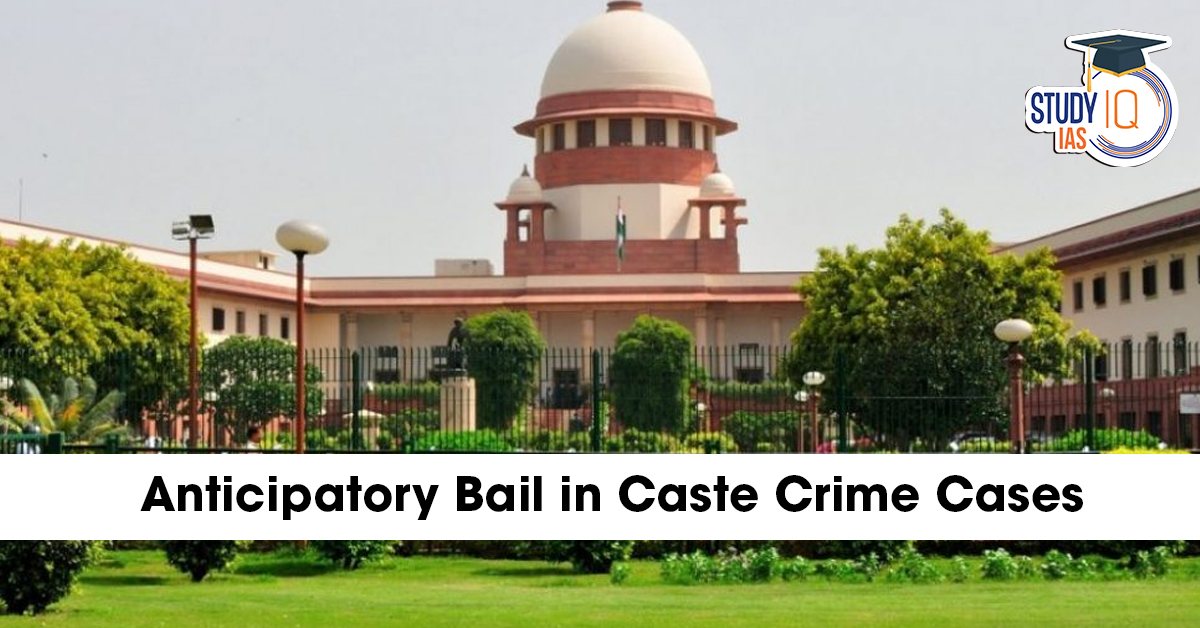Table of Contents
On September 1, 2025, the Supreme Court of India delivered a landmark judgment by quashing a Bombay High Court order that had granted anticipatory bail to an accused in a caste-related crime. The ruling once again highlighted the special legal framework surrounding caste-based atrocities in India and reaffirmed the prohibition of anticipatory bail under the Scheduled Castes and Scheduled Tribes (Prevention of Atrocities) Act, 1989 (SC/ST Act).
This article explores the concept of anticipatory bail in India, the legal exception under the SC/ST Act, judicial precedents, and the constitutional reasoning behind treating caste crimes differently.
What is Anticipatory Bail?
Anticipatory bail is a safeguard for individuals who fear arrest in a non-bailable offence. Unlike regular bail, which is sought after arrest, anticipatory bail is granted before an arrest actually takes place.
-
Provision under Law:
-
Anticipatory bail is provided under Section 482 of the Bharatiya Nagarik Suraksha Sanhita (BNSS), 2023 (formerly Section 438 of the CrPC, 1973).
-
It allows an accused to approach the court in advance and seek protection from arrest.
-
The court may impose conditions, such as cooperating with the investigation and not tampering with evidence.
-
Anticipatory bail is considered an important protection of individual liberty under Article 21 of the Constitution, ensuring that no person is unjustly deprived of freedom.
Exception in Caste-Related Crimes under SC/ST Act
While anticipatory bail is generally available for non-bailable offences, it is explicitly barred in cases registered under the SC/ST Act, 1989.
-
Section 18 of the SC/ST Act:
-
States that provisions of anticipatory bail do not apply to offences under the Act.
-
This means if a person is accused of committing atrocities against members of Scheduled Castes or Scheduled Tribes, they cannot seek anticipatory bail.
-
-
Rationale:
-
Caste-based crimes are not ordinary offences; they are rooted in historical oppression, discrimination, and systemic untouchability.
-
Denying anticipatory bail ensures that victims are not subject to intimidation, threats, or coercion during the investigation.
-
It strengthens the confidence of vulnerable communities in the justice system.
-
Thus, the law prioritizes the protection of victims’ rights over the accused’s right to anticipatory bail in such cases.
Supreme Court Judgments on Anticipatory Bail under SC/ST Act
The Supreme Court has consistently upheld the bar on anticipatory bail in caste-related crimes through several landmark judgments:
-
State of M.P. vs Ram Krishna Balothia (1995)
-
The court upheld the constitutional validity of Section 18 of the SC/ST Act.
-
It ruled that barring anticipatory bail does not violate Article 14 (Right to Equality) or Article 21 (Right to Life and Liberty).
-
-
Vilas Pandurang Pawar vs State of Maharashtra (2012)
-
The court reiterated that once a prima facie case under the SC/ST Act is made out, anticipatory bail cannot be granted.
-
-
Prathvi Raj Chauhan vs Union of India (2020)
-
The Supreme Court clarified that anticipatory bail remains barred under the SC/ST Act.
-
However, courts can still examine whether the allegations are prima facie false or motivated before denying bail.
-
The September 1, 2025 Ruling: Key Takeaways
-
The Supreme Court quashed the Bombay High Court’s order, which had granted anticipatory bail to an accused in a caste atrocity case.
-
The apex court emphasized that lower courts must strictly adhere to Section 18 of the SC/ST Act.
-
The ruling strengthens the legal position that anticipatory bail is not an option in caste crime cases, ensuring that victims receive justice without intimidation.
Constitutional Perspective
The differential treatment of caste-related crimes is constitutionally valid because:
-
Article 14 (Right to Equality): Equality does not mean treating unequal situations alike. Special protection for SC/ST communities is justified due to their historical marginalization.
-
Article 21 (Right to Life and Liberty): Denying anticipatory bail does not violate liberty since it balances the accused’s rights with the victim’s right to dignity, safety, and justice.
-
Directive Principles: Articles 46 and 38 of the Constitution require the state to protect weaker sections and promote social justice.
Conclusion
The Supreme Court’s September 2025 ruling is a significant reaffirmation of the protective framework of the SC/ST Act. By quashing the anticipatory bail order, the court reinforced that caste crimes demand a special legal approach due to their deep-rooted socio-historical context.
Anticipatory bail is a crucial safeguard in India’s criminal justice system, but its exclusion under the SC/ST Act underscores the need to prioritize the protection of vulnerable communities over procedural relief for the accused.
As caste-based discrimination and violence continue to pose challenges in India, the judiciary’s role in upholding these protective measures remains central to ensuring social justice and constitutional morality.


 Portable Nuclear Reactors in Warfare: Ne...
Portable Nuclear Reactors in Warfare: Ne...
 Ajnala Well Discovery: Rewriting Local H...
Ajnala Well Discovery: Rewriting Local H...
 Weaponisation of AI in Cybercrime: Threa...
Weaponisation of AI in Cybercrime: Threa...




















